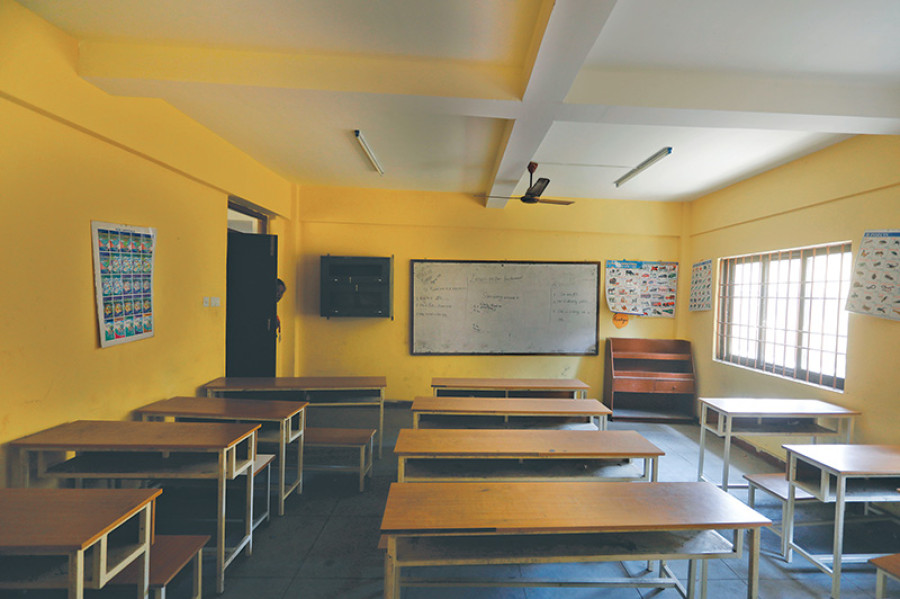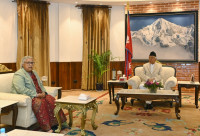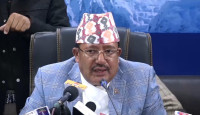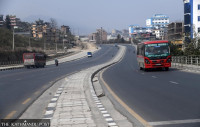National
Schools close again but there have been no preparation for virtual learning
Distance learning was not effective last year and as the virus may not go away soon, a long-term policy is required rather than seeking ad-hoc solutions, experts say.
Binod Ghimire
Tenth grader Sudip Kumar Thakur, who is preparing for the Secondary Education Examination scheduled for June, is worried.
“Schools have been closed again forcing us to opt for the online class again,” said Thakur. “I took the online classes for months [last year] but I couldn’t understand the lessons as the curriculum demanded. It is going to be the same now.”
During the in-person classes that he attended for around five months, after they were allowed from September by the federal government, his school had to revise the course covered during the earlier online classes as most students hadn’t grasped the course content well.
“The face-to-face learning that started a few months back had given me confidence that I would have good performance in the Secondary Education Examination,” he said. “Now I am doubtful.”
On Monday the Cabinet decided to close the schools in cities until May 14 and run online classes. These include schools in Kathmandu, Lalitpur, Biratnagar, Birgunj, Bharatpur and Pokhara metropolitan cities; Itahari, Dharan, Janakpur, Hetauda, Butwal, Ghorahi, Tulsipur, Nepalgunj and Dhangadhi sub-metropolitan cities; all municipalities in Kathmandu, Lalitpur and Bhaktapur districts; and Mechinagar, Birtamod, Damak, Rajbiraj, Banepa, Dhulikhel, Siddharthanagar, Birendranagar and Bhimdatta municipalities.
The decision came after the Ministry of Health recommending closure of schools in 14 districts including Kathmandu, Bhaktapur, Lalitpur, Kaski, Rupandehi, Chitwan, Banke, Parsa, Kailali, Morang, Dang, Surkhet, Bara and Baglung, where the number of cases have been surging of late.
Health experts and officials have been concerned that a growing number of children are getting infected this time round. While only 4 percent of the total infected were children last year this time it is in double digits and estimated at 14 percent.
But like Thakur, for hundreds of thousands of students online classes or classes through the radio and television have not been a good one as far as teaching is concerned although it may have been done to protect their health.
Different studies suggest that the virtual learning conducted online and through television and radio was largely ineffective.
They had pointed out different reasons for the ineffectiveness: lack of student’s access to the virtual learning platform, the inability of the teachers to deliver properly through those platforms and lack of interaction, mainly through the television and radio.
A study by the National Campaign for Education, an umbrella body of over 300 organisations working in the education sector, published in December last year showed virtual learning was ineffective for 64.3 percent of students surveyed. The survey carried out among the students, guardians and teachers from different districts in the seven provinces suggested that virtual learning didn’t yield satisfactory results.
While students in cities may have the luxury of online classes, in rural Nepal teaching learning had taken place through the radio.
Jit Bahadur Raskoti Magar, an eighth grader from Deependra Hom Jun Secondary School in Gadhawa Rural Municipality Dang said he only has access to the radio for the virtual learning but it was boring.
He said he seldom ‘attended’ classes conducted via radio last year because he couldn’t grasp much.
“I had learnt nothing until my school started classes in our physical presence,” he told the Post over the phone. “I have heard about the closure of the schools again but haven’t heard anything from our teachers.”
A survey report by UNICEF Nepal in August found that more than two-thirds of schoolchildren in Nepal are deprived of distance learning opportunities. The Child and Family Tracker Survey, carried out among 7,500 households also show that the poorer the household the less likely it is that children have access to or use distance learning.
After an assessment that the students couldn’t get to study properly through the virtual learning platforms, the government pushed the ongoing academic session till June, which otherwise ends in April, despite reducing the curriculum load by 30 percent. While the face-to-face learning in most of the schools commenced from September, some local governments had resumed it as early as July.
Education experts are worried that not only will learning achievement be affected as schools have shut in cities, but last year’s problems are still here and nothing has been done to address them.
“All tiers of government have failed to learn from last year. No concrete measures have been taken to better the situation of virtual or alternative learning,” Binay Kusiyait, a professor at the Tribhuvan University who has conducted several researches on the school education, told the Post.
While the federal government limited its role to just producing the contents for virtual learning platforms, the local and provincial government mostly did nothing other than airing the contents, according to experts.
“The government’s focus has been on non-interactive means as they are more accessible,” Basudev Kafle, a professor at the Tribhuvan University who was a member of the High Level National Education Commission that the present government had formed in August 2018, told the Post. “However, the student’s learning achievement is poor through the non-interactive medium.”
Teachers agree that interactive learning is more effective but its spread across the country is not even as most students lack access to the broadband internet. Efficacy of distance learning will not improve even with another lockdown unless the government comes up with a strong plan to equip schools and the students with digital technology.
“We could have done a lot in one year but we wasted it,” Baburam Thapa, chairperson of Nepal Teachers’ Federation told the Post. “We have urged the government to allocate adequate budget and come up with necessary policies to increase access to the online study in the upcoming budget.”
With no end to the ongoing Covid-19 pandemic in sight and the present surge in cases in the country evidence that a lull even in future could only be a sign of the virus hitting back more ferociously, investment in technology is the only long term solution.
“One after another wave of the coronavirus has shown digital learning is the future and therefore, all tiers of government should give due focus to it,” said Kafle. “I have found teachers' adaptability to online teaching has increased with last year’s experience. However, that is meaningless unless students have access to the internet-based learning platform.”
Government officials, however, claim that they are in a better position to impart virtual learning compared to last year.
“We have learnt from last year’s experience. So we are better prepared this time,” Keshav Dahal, spokesperson at Centre for Education and Human Resource Development, the government body to oversee the school education, told the Post. “We have proposed an adequate allocation of the budget for virtual learning in the new budget.”
But for students from rural areas like Magar it will be some time before the budget is approved, and his studies may be virtual.
In the immediate future if his school closes he doesn’t think he will ‘attend’ classes held through the radio.
“The teaching might start through FM radio now,” he said. “However, I find study from the radio boring. I don’t think I will study from the radio.”
Experts on the other hand say that a consistent long-term policy is required rather than a reactive one.
“Our system runs on ad-hocism which never yields good results,” said Kusiyait.




 10.91°C Kathmandu
10.91°C Kathmandu















